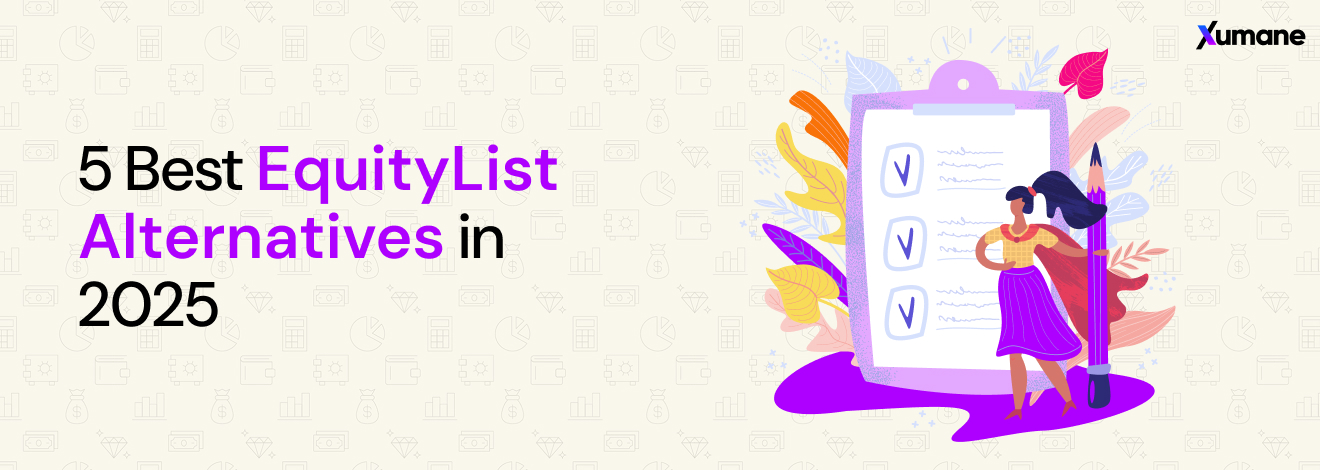
Subscribe to stay ahead with expert insights on ESOPs, smart ownership strategies, and more!
Editor's Note:-Although EquityList is an excellent tool, it might not be the most suitable one for your distinct ESOP management needs. To address this, we've curated a selection of 5 best-in-class tools designed to ensure the seamless operation of the ESOP scheme within your company.
Well, EquityList is a robust platform designed to facilitate seamless management of the ESOP pool, vested-unvested options, schedules, and more.
It enables its admins and users to conduct valuation exercises and implement various ESOP management practices, promoting smarter decisions.
However, it might not be the most ideal solution for your evolving equity management needs. While some users think it is a static platform, offering limited features, others believe that its new pricing plans do not complement their operational workflows.
So, if you’re looking for alternatives to EquityList, this list of the top 5 tools will help you in your overall search. Among these options, we are confident that you will find a tool that aligns with your specific needs and contributes to the efficient operation of the ESOP scheme within your organization.
We explored the top equity-related platforms and compiled the top alternatives to EquityList. For some tools, we engaged with colleagues to gain firsthand insights and experiences with the tools featured in the list below.

Xumane is a solid equity and cap table management platform, combining simplicity with excellence.
The tool offloads a lot of your daily tasks and helps you effortlessly oversee ESOP programs and manage the associated database needs. This, in turn, allows you to concentrate on running your business seamlessly.
The platform offers error-free reconciliation, delivering a transparent ownership experience. Moreover, its proactive customer support sets an industry standard, offering a fast 24-hour onboarding experience for all clients.
Overall, Xumane enables you to automate essential processes such as granting, vesting, and exercising equity allocations. This comprehensive feature set further enhances the platform's appeal, making it an invaluable asset for businesses seeking efficiency and precision in equity management.
Price: Starts at ₹30,000/year. (upto 20 stakeholders)

Source: vestd
Vestd, the cutting-edge equity management platform, enables strategic planning through robust scenario modeling, providing a powerful tool for businesses to navigate various possibilities and make informed decisions.
It also streamlines share issuance by seamlessly updating Companies House with no cumbersome forms.
Offering rich solutions, it enables the effortless design, launch, and management of company share schemes, including co-founder equity splits, vesting, and prenups.
Moreover, it streamlines company governance tasks by storing resolutions, confirmation statements, and other documents, making Co-Sec responsibilities virtually paperwork-free.
Price: Starts at £155/month.

Source: ledgy
Ledgy drives equity management with seamless automation, ensuring effortless handling of extensive data and documents with maximum accuracy.
The tool helps you achieve compliance effortlessly by consolidating all equity-related information in a secure, single source of truth. It integrates with some popular HR systems and third parties involved in managing equity.
Reporting becomes a breeze, facilitating error-free equity management for IPO readiness.
Ledgy's comprehensive tracking system meticulously records historical transactions for various currencies, covering issuances, stock splits, valuations, secondaries, convertible loans, and more.
Price: Starts at €900/year.

Source: carta
Carta helps you manage valuations, investments, and equity plans effortlessly. You can issue, track, and process payments for your company’s securities with fast, affordable, and accurate valuations.As securities are issued and transactions occur, its cap tables update automatically to handle data-feeding mistakes or reconciliation.
Not just this. The platform also automatically accrues equity expense in real time and generates expense (IFRS2/ASC718) reports in minutes.
As an admin, you can pull detailed expense reports whenever needed. Its expense reporting supports every scenario, including stock splits and grant re-pricings.
Price: Free plan available. Advanced plan pricing available on request.

Source: pulley
Pulley is another equity management software worth your attention in 2024, offering a seamless experience for founders, investors, and employees.
Boost investor confidence by managing your entire fundraising process effortlessly on Pulley - from modeling your round to issuing SAFEs and collecting wires.
What sets Pulley apart is its ability to create comprehensive pro forma for your next round, providing insights into ownership and share distribution among founders, employees, current, and future investors.
Using the tool, you can export the pro forma to Excel for easy sharing with investors, cofounders, and legal advisors.
Price: Starts at $1200/year.
EquityList serves as an efficient equity management tool, catering to the diverse needs of its users. However, it might not be suitable for every business. Therefore, seeking an alternative is only natural.
In this blog, we delved into some solid tools’ best features and functionalities. Now, the decision rests in your hands!
Begin by pinpointing your non-negotiable requirements and then explore additional features that could prove valuable as your business expands.
Ask yourself:
Best of luck!
Top alternatives to EquityList in 2025 include Xumane, Vestd, Ledgy, Carta, and Pulley, each offering some unique features to help you make ESOP management smarter, quick and scalable.
The above-mentioned EquityList alternatives help improve ESOP scheme operations by automating equity allocation processes, offering transparent plan monitoring, and allowing scenario modelling. These also offer data-rich reports that help ease tracking and simplify compliance, while reducing manual errors.
Yes, platforms like Xumane and Ledgy can enable company governance and compliance by storing data, simplifying share issuance, and offering rich reports that ensure compliance and regulations.
Pricing of different tools varies significantly. A tool like Xumane starts at ₹30,000/year while Vestd starts at £155/month. Ledgy starts at €900/year, Carta offers a free plan with advanced pricing on request, and Pulley starts at $1,200/year. Note that pricing is hugely dependent on the kind of features a tool offers under a particular plan, how scalable it is, how the after-sales support is like, etc.